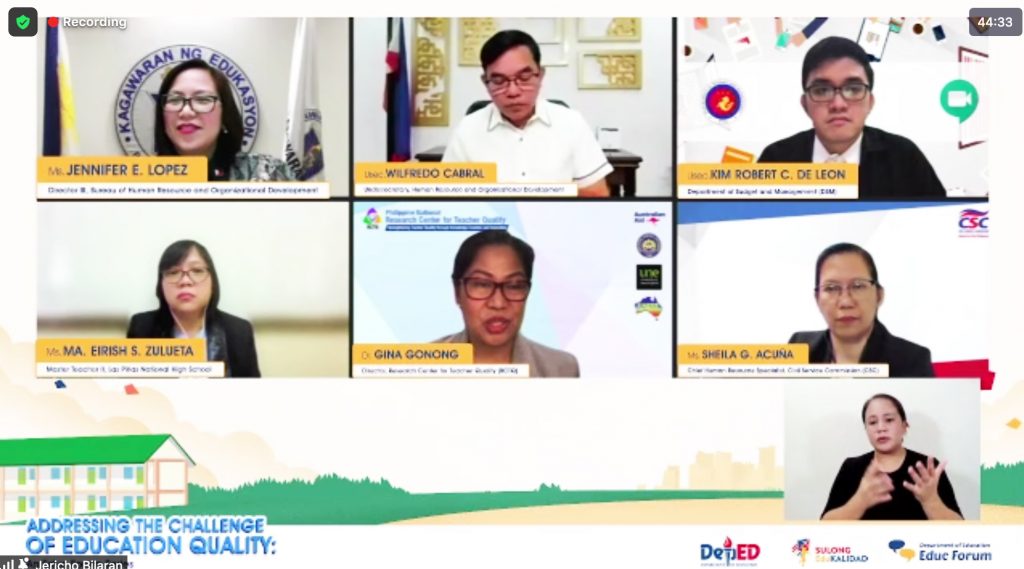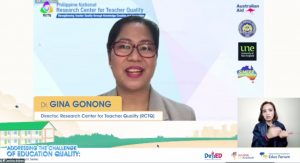RCTQ joins DBM, CSC as reactors to DepEd’s proposed career progression system for teachers
The Department of Education’s proposed career progression system for teachers took center stage at the Episode 3 of DepEd’s virtual Education Forum (Educ Forum) series on 6 October 2021 as the Bureau of Human Resource and Organizational Development (BHROD) presented pathways for career advancement of public school teachers.
RCTQ Director Dr. Gina Gonong was one of the four reactors to the policy presentation which included Department of Budget and Management (DBM) Undersecretary Mr. Kim Robert de Leon, Civil Service Commission (CSC) Chief Human Resource Specialist Ms. Sheila Acuña, and a representative of teachers, Las Piñas National High School Master Teacher II Ms. Ma. Eirish Zulueta.

Dr. Gonong is joined by DepEd Undersecretary Wilfredo Cabral, BHROD Director III Dr. Jennifer Lopez and fellow reactors from the Department of Budget and Management, Civil Service Commission and Las Pinas National High School.
Undersecretary Wilfredo Cabral, DepEd OIC Undersecretary for Human Resource and Organizational development, presented the agency’s “vision for teachers’ career progression” and the ways DepEd intends to realize this vision based on an extensive study.
“We, in the Department, envision that i) no single teacher should retire at Teacher 1; ii) teachers’ career paths should allow them to remain in the classroom while advancing in stature and compensation, iii) teachers are given career options between classroom teaching and school administration, and iv) teachers’ career advancement shall be based on the quality of teaching practice where promotion should be self-paced,” Usec. Cabral said.
The proposed career progression system offers teachers the opportunities for career movement, professional growth, and eventually, financial stability. Once approved as policy, DepEd will be creating teaching positions Teacher III, IV, V, VI, VII, and Master Teacher V, and will be institutionalizing a merit-based promotion anchored on the PPST.
Usec. Cabral presented the various career paths for teachers based on the Philippine Qualifications Framework and the PPST as a framework for teacher quality vis-a-vis the classroom teacher career line. He also presented the PPST-based reclassification policy.
“By establishing the professional standards of teacher quality and using these quality standards in the selection, hiring, and promotion of teachers, in assessing their performance, in planning and providing professional development interventions, and in rewarding and incentivizing teacher, we could guarantee that the quality of our teachers in our classrooms are of high standards,” the concurrent regional director of DepEd National Capital Region said as he encouraged teachers “to embrace the professional standards in their professional lives.”
Reacting to his presentation, Dr. Gonong lauded the DepEd’s move to anchor teachers’ career advancement on the quality of teaching practice. The proposed career progression system, she said, is “comprehensive, evidence-based and, most of all, supportive of teachers.” She said “it is worthy to note that teachers’ voices are heard in the process.”
“We are aware that the current promotion system is limited for teachers who want to stay as classroom teachers. To progress in their careers, teachers shift to principal or supervisor positions which are positions with higher salary grades. We lose some quality teachers in the classroom in the process. In the proposed system, we see higher career stage teachers or the highly proficient and distinguished teachers, getting equivalent salary grades as school principals. This is commendable,” Dr. Gonong said.
“We see this move as contributing to lifting the status of the teaching profession – teachers don’t need to leave the classroom to be recognized as high-quality professionals”, the RCTQ director added. “The career progression system is expected to bring positive results towards quality teachers and teaching, and consequently, quality learner outcomes.”
Also remarkable in the draft policy, Dr. Gonong said, is the inclusion of an assessor’s program in the 2022-2026 career progression roadmap. “To help make the career progression system work, we need teachers to trust the assessment process, and the assessors. DepEd needs to ensure the national consistency and trustworthiness of assessment,” she said.
Dr. Gonong also appreciated how teacher professional development becomes part of the teacher reclassification criteria of the career progression system.
“We are aware that DepEd is making a huge investment on strategic professional development for teachers linked to the standards. It is good to see in Usec Cabral’s presentation that career progression is linked to career stage recognition and salary increase.”
While praising the features of the proposed system, Dr. Gonong suggested to link career progression to pre-service teacher education which she said is “critical to the success of DepEd’s efforts on teacher development”.
She said, “There should be a strong link between DepEd schools and the Commission on Higher Education -Teacher Education Institutions (TEIs) by placing both institutions on the same teacher quality continuum based on the professional standards. This will create a unified approach to enhancing the knowledge, skills or practices of teachers across the country. There needs to be a high-quality pre-service teacher education.”
When pre-service teachers cross over to in-service as beginning teachers, Dr. Gonong emphasized the importance of supporting them especially during the pandemic, highlighting also the big role that the National Educators Academy of the Philippines (NEAP) plays in supporting teachers to move higher in the career continuum.
“Research shows that beginning teachers who are mentored and receive other kinds of support are more likely to stay in the profession and are more likely to be effective in helping students learn. We see that the new career progression system will motivate teachers to stay in the profession and become better teachers,” she said.
Dr. Gonong shared the recent unanimous approval at the Senate of the Senate Bill No. 2152 or the Teacher Education Excellence Act, a bill that PNU-RCTQ helped draft with the Malacanang-led Technical Working Group for Teacher Quality (TWG-TQ), which seeks to strengthen the Teacher Education Council and the National Educators Academy.
Watch Dr. Gonong’s full reaction on this video:
Other reactors expressed support for the proposed career progression system.
CSC Chief Human Resource Specialist Ms. Sheila Acuña, in her reaction, said the proposed system is aligned with the principle of the Program to Institutionalize Meritocracy and Excellence in Human Resource Management (PRIME HRM) of the CSC, which seeks to show value for government employees.
“Making clear the career progression of teachers can be seen as a way of taking care of this sector in government that accounts for almost half of the total number of government employees. With the new system, the teacher’s progression from one position to a higher one shall not be based on mere meeting the credentials. It shall be based on the past performance or competency assessment, and meeting the established professional standards for teachers,” Ms. Acuña said.
DBM Undersecretary Mr. Kim Robert de Leon, for his part, expressed the DBM’s support for the draft executive order which will amend Executive Order No. 500, s. 1978 titled Establishing a New System of Career Progression for Public School Teachers. He said once the new EO is signed, the DBM is ready to help operationalize the new system for teachers.
“One good thing about this new career progression system is that teachers do not have to wait for vacancies in order to get promoted. On the budget side, we have to make sure that the level of promotion and level of reclassification that we are instituting by way of this system are sustainable.
LPNHS Master Teacher II Ms. Ma. Eirish Zulueta, in her reaction, recalled how she witnessed previous colleagues retire as Secondary School Teacher II “even after two decades of service and despite their dedication to the teaching profession”. She attributed this to the high competition in promotions triggered by the limited plantilla items in the current system.
“The vision of the proposed new career progression system to advance the stature and compensation of the teachers through self-paced promotion is a welcome opportunity for most of the teachers. With the clear qualification standards, definite indicators of career stages in PPST, well-defined performance indicators in the RPMS tools, and the opening of higher ranks to many teachers, I believe that having seasoned teachers retire at a low salary grade will be prevented. This, in a way, assures them of decent lives during their retirement,” said Ms. Zulueta.
Dr. Gonong joined Usec. Cabral and the three reactors in responding to questions from teachers and school leaders during the episode’s open forum moderated by BHROD Director Dr. Jennifer Lopez. Dir. Lopez started by expressing appreciation to RCTQ for its range of technical assistance to the BHROD including on career progression.
Watch the full Educ Forum episode below as streamed via the DepEd’s official Facebook page. The episode has been viewed by 4,200 viewers as of this writing.
(AYana/RCTQ)
https://www.rctq.ph/?p=3229NewsCareer Progression




